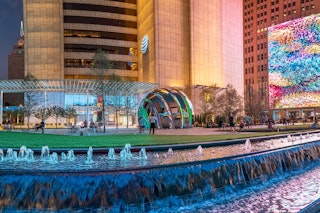Museums, performing companies and landmarks are included in this - but there are plenty more! Use our list as your guide as you explore and experience diversity in Dallas.
African American Museum
The African American Museum in Fair Park is the only institution of its kind in the Southwest offering an impressive collection of African and African American art, featuring one of the largest folk art collections in the nation.
The Bishop Arts Theatre Center
The Bishop Arts Theatre Center provides cultural and artistic opportunities to marginalized individuals and use theatre as a platform for social change.
Remembering Black Dallas
Remembering Black Dallas preserves and promotes African American life, history and culture in Dallas. They also host local bus tours and historical presentations.
The Black Academy of Arts and Letters, Inc.
Founded in the 1970s, The Black Academy of Arts and Letters (TBAAL) promotes, cultivates and preserves the African and African American performing arts. The academy is comprised of two theatres and has been the launching pad for local artists like Grammy winner Erykah Badu and Golden Globe winner Regina Taylor. The organization also hosts the annual Riverfront Jazz Festival.
Dallas Black Dance Theatre
Dallas Black Dance Theatre is an internationally recognized professional dance company that presents performances from the African American experience. Since the company was founded in 1976, its dancers have performed in 16 countries, including at two Olympics, the Kennedy Center in Washington D.C., the Lincoln Center in New York City, and before the Queen of England. DBDT was the first Texas performing arts group to perform in South Africa for Nelson Mandela in 1998.
South Dallas Cultural Center
Experience the African American culture that embodies Dallas at the South Dallas Cultural Center. The center is well known for its summer programming that includes both adult and kid classes such as Brazilian dance and hip hop poetry. The center also includes a 120-seat box theatre used for movie nights, concerts and dance festivals and the Arthello Beck gallery, a visual arts space that features a different artist each month.

















